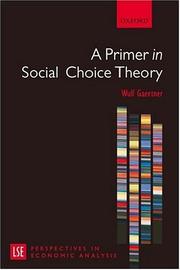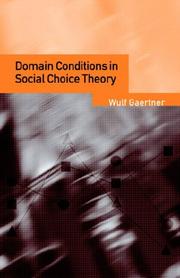| Listing 1 - 10 of 10 |
Sort by
|

ISBN: 9780199297504 9780199297511 0199297517 0199297509 Year: 2006 Publisher: Oxford Oxford University Press
Abstract | Keywords | Export | Availability | Bookmark
 Loading...
Loading...Choose an application
- Reference Manager
- EndNote
- RefWorks (Direct export to RefWorks)
Sociological theories --- Operational research. Game theory --- #SBIB:303H10 --- #SBIB:303H12 --- #SBIB:316.21H41 --- 330.1 --- 316 --- 330.105 --- Social choice --- 302 --- Choice, Social --- Collective choice --- Public choice --- Choice (Psychology) --- Social psychology --- Welfare economics --- Methoden en technieken: algemene handboeken en reeksen --- Methoden en technieken: sociale wetenschappen --- Theoretische sociologie: ruiltheorie, rational choice --- Economische grondbegrippen. Algemene begrippen in de economie --- Sociologie --(algemeen) --- Wiskundige economie. Wiskundige methoden in de economie --- Social choice. --- 330.105 Wiskundige economie. Wiskundige methoden in de economie --- 316 Sociologie --(algemeen) --- 330.1 Economische grondbegrippen. Algemene begrippen in de economie
Book
ISBN: 9780199565306 0199565309 9786612268823 1282268821 0191569879 9780191569876 0191609897 Year: 2009 Publisher: Oxford: Oxford university press,
Abstract | Keywords | Export | Availability | Bookmark
 Loading...
Loading...Choose an application
- Reference Manager
- EndNote
- RefWorks (Direct export to RefWorks)
This introductory text explores the theory of social choice. This text is an important starting point for students grappling with the complexities of social choice theory. Rigorous yet accessible, with new chapter exercises, it avoids the use of technical language and provides an up-to-date discussion of this rapidly developing field.
Social choice --- Decision making -- Social aspects. --- Leadership. --- Social choice. --- Economic Theory --- Business & Economics --- AA / International- internationaal --- 330.580 --- 303.0 --- 305.0 --- econometrie --- mathematische modellen, toegepast op economie --- besluitvorming --- milieubeleid --- Gecontroleerde economie. Geleide economie. Welvaarststaat. Algemeenheden. --- Statistische technieken in econometrie. Wiskundige statistiek (algemene werken en handboeken). --- Toegepaste econometrie en statistiek (algemene naslagwerken). Statistische onderzoekingen en studiën. --- Choice, Social --- Collective choice --- Public choice --- Choice (Psychology) --- Social psychology --- Welfare economics --- E-books --- Statistische technieken in econometrie. Wiskundige statistiek (algemene werken en handboeken) --- Toegepaste econometrie en statistiek (algemene naslagwerken). Statistische onderzoekingen en studiën --- Gecontroleerde economie. Geleide economie. Welvaarststaat. Algemeenheden

ISBN: 0521028744 0511016239 0511046715 0511492308 1280159294 0521791022 0511118988 0511154003 0511328176 9780521791021 9780521028745 9780511492303 1107121418 9780511016233 9780511118982 9780511046711 9780511154003 9781107121416 9780511328176 9781280159299 Year: 2001 Publisher: Cambridge: Cambridge university press,
Abstract | Keywords | Export | Availability | Bookmark
 Loading...
Loading...Choose an application
- Reference Manager
- EndNote
- RefWorks (Direct export to RefWorks)
Wulf Gaertner provides a comprehensive account of an important and complex issue within social choice theory: how to establish a social welfare function while restricting the spectrum of individual preferences in a sensible way. Gaertner's starting point is K. J. Arrow's famous 'Impossibility Theorem', which showed that no welfare function could exist if an unrestricted domain of preferences is to be satisfied together with some other appealing conditions. A number of leading economists have tried to provide avenues out of this 'impossibility' by restricting the variety of preferences: here, Gaertner provides a clear and detailed account, using standardized mathematical notation, of well over forty theorems associated with domain conditions. Domain Conditions in Social Choice Theory will be an essential addition to the library of social choice theory for scholars and their advanced graduate students.
Decision making - Mathematical models. --- Social choice. --- Social choice --- Decision making --- Business & Economics --- Economic Theory --- Mathematical models --- Business, Economy and Management --- Economics --- Mathematical models. --- Sociale politiek. Maatschappelijke opbouw. Sociale problemen, vraagstukken --- -Sociale politiek. Maatschappelijke opbouw. Sociale problemen, vraagstukken --- 304 Sociale politiek. Maatschappelijke opbouw. Sociale problemen, vraagstukken --- 304 --- 330.1 --- 330.1 Economische grondbegrippen. Algemene begrippen in de economie --- Economische grondbegrippen. Algemene begrippen in de economie --- Decision Making --- Social choice - Mathematical models --- Decision Making - Mathematical models
Book
ISBN: 9781107013940 1107013941 9781139012867 9781139224598 113922459X 113901286X 1107229723 1139209930 1280485264 1139222872 9786613580245 1139218077 1139214985 1139221159 Year: 2012 Publisher: Cambridge ; New York : Cambridge University Press,
Abstract | Keywords | Export | Availability | Bookmark
 Loading...
Loading...Choose an application
- Reference Manager
- EndNote
- RefWorks (Direct export to RefWorks)
Since Aristotle, many different theories of distributive justice have been proposed, by philosophers as well as social scientists. The typical approach within social choice theory is to assess these theories in an axiomatic way - most of the time the reader is confronted with abstract reasoning and logical deductions. This book shows that empirical insights are necessary if one wants to apply any theory of justice in the real world. It does so by confronting the main theories of distributive justice with data from (mostly) questionnaire experiments. The book starts with an extensive discussion on why empirical social choice makes sense and how it should be done. It then presents various experimental results relating to theories of distributive justice, including the Rawlsian equity axiom, Harsanyi's version of utilitarianism, utilitarianism with a floor, responsibility-sensitive egalitarianism, the claims problem and fairness in health.
Microeconomics --- Social choice --- Distributive justice --- Social choice. --- Distributive justice. --- Distribution (Economic theory) --- Justice --- Social justice --- Wealth --- Choice, Social --- Collective choice --- Public choice --- Choice (Psychology) --- Social psychology --- Welfare economics --- Moral and ethical aspects --- Business, Economy and Management --- Economics
Book
ISBN: 3428494164 3428094166 3428794168 Year: 1998 Publisher: Berlin, [Germany] : Duncker & Humblot,
Abstract | Keywords | Export | Availability | Bookmark
 Loading...
Loading...Choose an application
- Reference Manager
- EndNote
- RefWorks (Direct export to RefWorks)
Der vorliegende Band enthält die überarbeiteten Beiträge zweier Sitzungen des Ausschusses ""Wirtschaftswissenschaften und Ethik"" im Verein für Socialpolitik. Dieser Ausschuß setzt sich aus Wirtschaftswissenschaftlern sowie Philosophen und Theologen zusammen. Karl Homann sowie Johannes Hackmann beginnen den Band mit methodischen Grundsatzüberlegungen zum Verhältnis von Moral und Ökonomie, von Ethik und Ökonomik. Bruno Staffelbach erläutert drei Bereiche und zwei Funktionen der empirischen Forschung in der Unternehmensethik. Wulf Gaertner untersucht das Verhältnis von Rationalitätspostulaten un
Economics --- Economic theory --- Political economy --- Social sciences --- Economic man --- Moral and ethical aspects.
Book
ISBN: 3428501608 342810160X 3428801601 Year: 2000 Publisher: Berlin, [Germany] : Duncker & Humblot,
Abstract | Keywords | Export | Availability | Bookmark
 Loading...
Loading...Choose an application
- Reference Manager
- EndNote
- RefWorks (Direct export to RefWorks)
Business ethics. --- Business --- Businesspeople --- Commercial ethics --- Corporate ethics --- Corporation ethics --- Professional ethics --- Wealth --- Moral and ethical aspects
Book
Year: 1988 Publisher: Kunitachi
Abstract | Keywords | Export | Availability | Bookmark
 Loading...
Loading...Choose an application
- Reference Manager
- EndNote
- RefWorks (Direct export to RefWorks)
Book
Year: 1991 Publisher: Kunitachi
Abstract | Keywords | Export | Availability | Bookmark
 Loading...
Loading...Choose an application
- Reference Manager
- EndNote
- RefWorks (Direct export to RefWorks)
Book
ISBN: 3540150951 0387150951 3642884083 Year: 1985 Publisher: Berlin Springer
Abstract | Keywords | Export | Availability | Bookmark
 Loading...
Loading...Choose an application
- Reference Manager
- EndNote
- RefWorks (Direct export to RefWorks)
Robbery, larceny, blackmail, fraud, and other crimes with economic motives are likely to be as old as mankind, and the evasion of taxes and economic regulations can be assumed to begin with the introduction of taxes and economic regulations. Thus the shadow economy is certain ly not a new phenomenon. However, economists did not pay much attention to it until quite recently. P. GUTMANN in his pioneering article "The Subterranean Economy" (Financial Analysts Journal, Nov/Dec 1977, p. 24- 27) was first to point out that unreported economic activity cannot (or, at least, can no longer) be considered as a "quantite negligeable". Challenged by GUTMANN's hypothesis many economists have then tried to assess the quantitative and qualitative importance of the shadow economy (commonly also known as the underground, or subterranean, or black, or unreported economy, and by other names). There seems to be wide agreement nowadays that the shadow economy has not only reached a substantial portion of total economic activity in both Eastern and Western countries but that it is also growing at rates which can no longer be experienced in the official sector. The existence of a considerable volume of unreported economic activities implies that important macroeconomic variables are biased in the official statistics. The rate of unemployment, for example, may be over-estimated while production figures, on the other hand, tend to be underrated. The government could thus be mislead and choose inadequate policies.
Economic structure --- Business & Economics --- Economic Theory --- AA / International- internationaal --- 336.208 --- 343.35 --- 335 --- Proceedings of the International Conference held at the University of Bielefeld, West Germany, October 10-14, 1983. --- NBB congres --- Grondslag, vereffening, inning en controle van de belastingen. Fiscale fraude. Zwartwerk. Parallelle economie. --- Misdrijven tegen de openbare administratie, de belasting- en administratieve wetgeving. --- Economie van conflicten en van verdediging. Oorlog. Terrorisme. Economisch herstel. --- Conferences - Meetings --- Informal sector (Economics) --- Congresses. --- Proceedings of the International Conference held at the University of Bielefeld, West Germany, October 10-14, 1983 --- Grondslag, vereffening, inning en controle van de belastingen. Fiscale fraude. Zwartwerk. Parallelle economie --- Misdrijven tegen de openbare administratie, de belasting- en administratieve wetgeving --- Economie van conflicten en van verdediging. Oorlog. Terrorisme. Economisch herstel
Digital

ISBN: 9783486828085 9783486559491 Year: 2019 Publisher: Berlin ;; Boston Oldenbourg Wissenschaftsverlag
Abstract | Keywords | Export | Availability | Bookmark
 Loading...
Loading...Choose an application
- Reference Manager
- EndNote
- RefWorks (Direct export to RefWorks)
| Listing 1 - 10 of 10 |
Sort by
|

 Search
Search Feedback
Feedback About UniCat
About UniCat  Help
Help News
News